Safety Issues in Perioperative Nursing: A Reflective Account
VerifiedAdded on 2023/06/04
|11
|2791
|258
AI Summary
This article discusses the safety issues in perioperative nursing, with a focus on medication errors and their impact on patients and nurses. It also includes a reflective account on how the research for this activity and the evidence discovered changed the author's perspective as a student nurse.
Contribute Materials
Your contribution can guide someone’s learning journey. Share your
documents today.
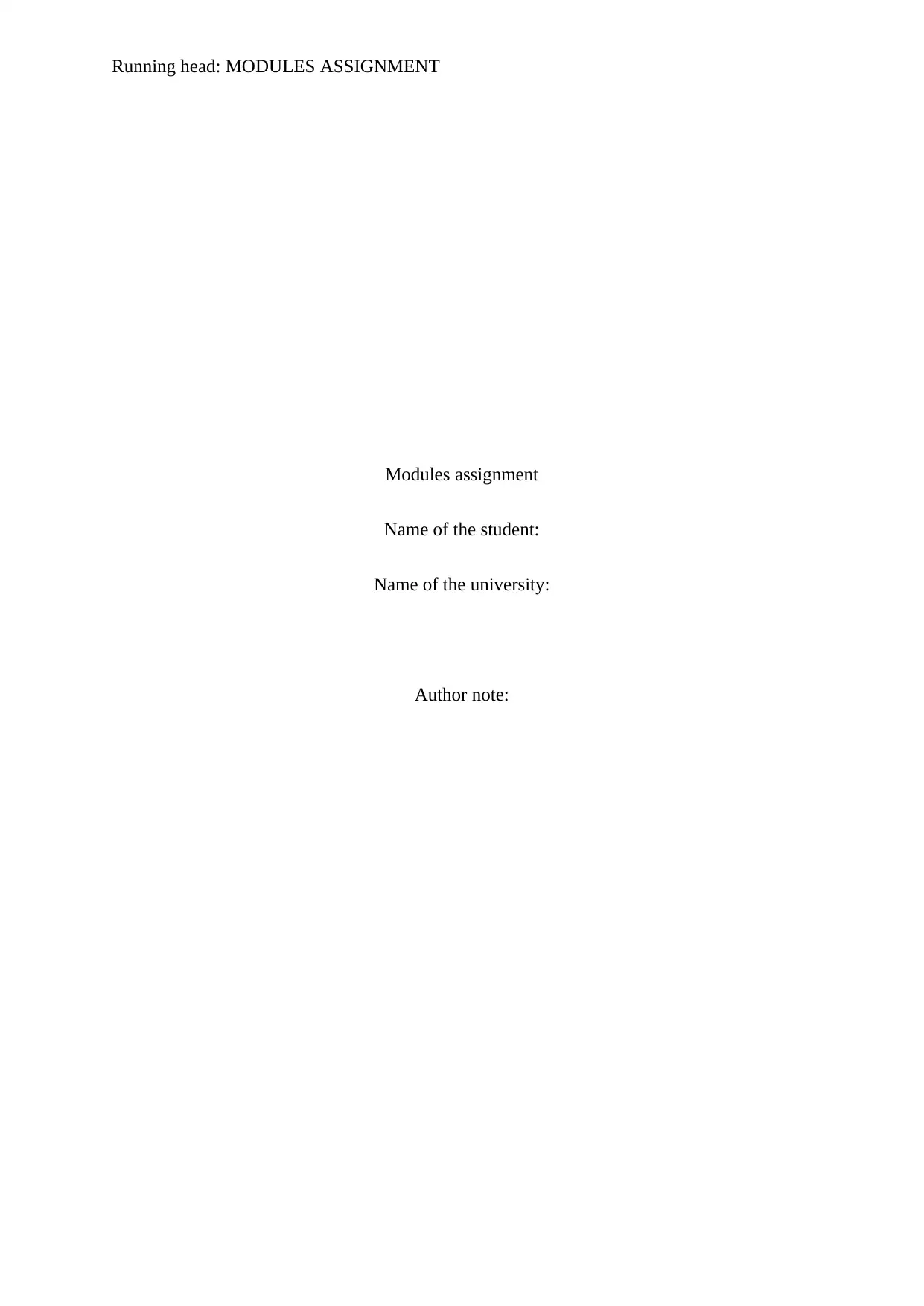
Running head: MODULES ASSIGNMENT
Modules assignment
Name of the student:
Name of the university:
Author note:
Modules assignment
Name of the student:
Name of the university:
Author note:
Secure Best Marks with AI Grader
Need help grading? Try our AI Grader for instant feedback on your assignments.
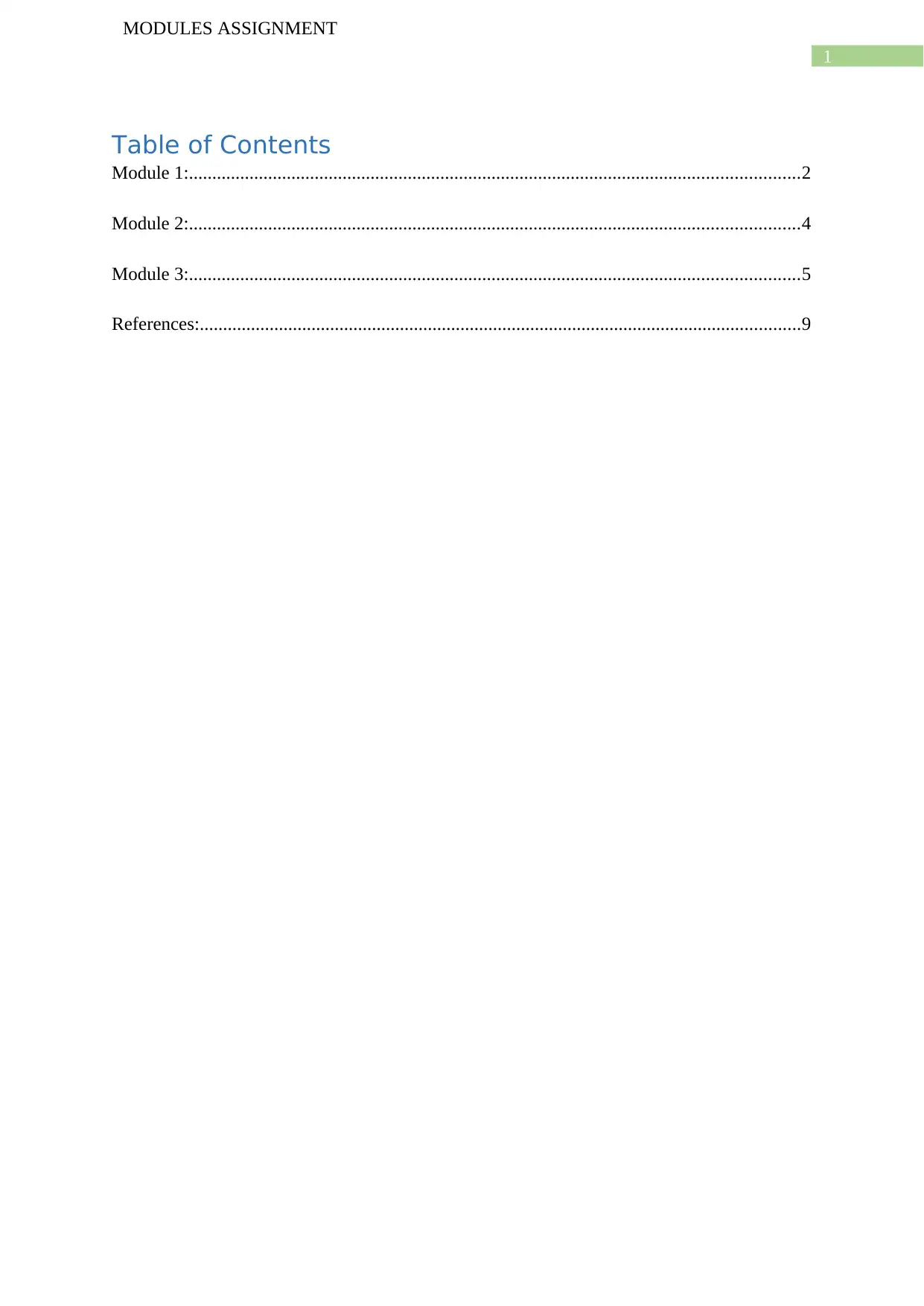
1
MODULES ASSIGNMENT
Table of Contents
Module 1:...................................................................................................................................2
Module 2:...................................................................................................................................4
Module 3:...................................................................................................................................5
References:.................................................................................................................................9
MODULES ASSIGNMENT
Table of Contents
Module 1:...................................................................................................................................2
Module 2:...................................................................................................................................4
Module 3:...................................................................................................................................5
References:.................................................................................................................................9
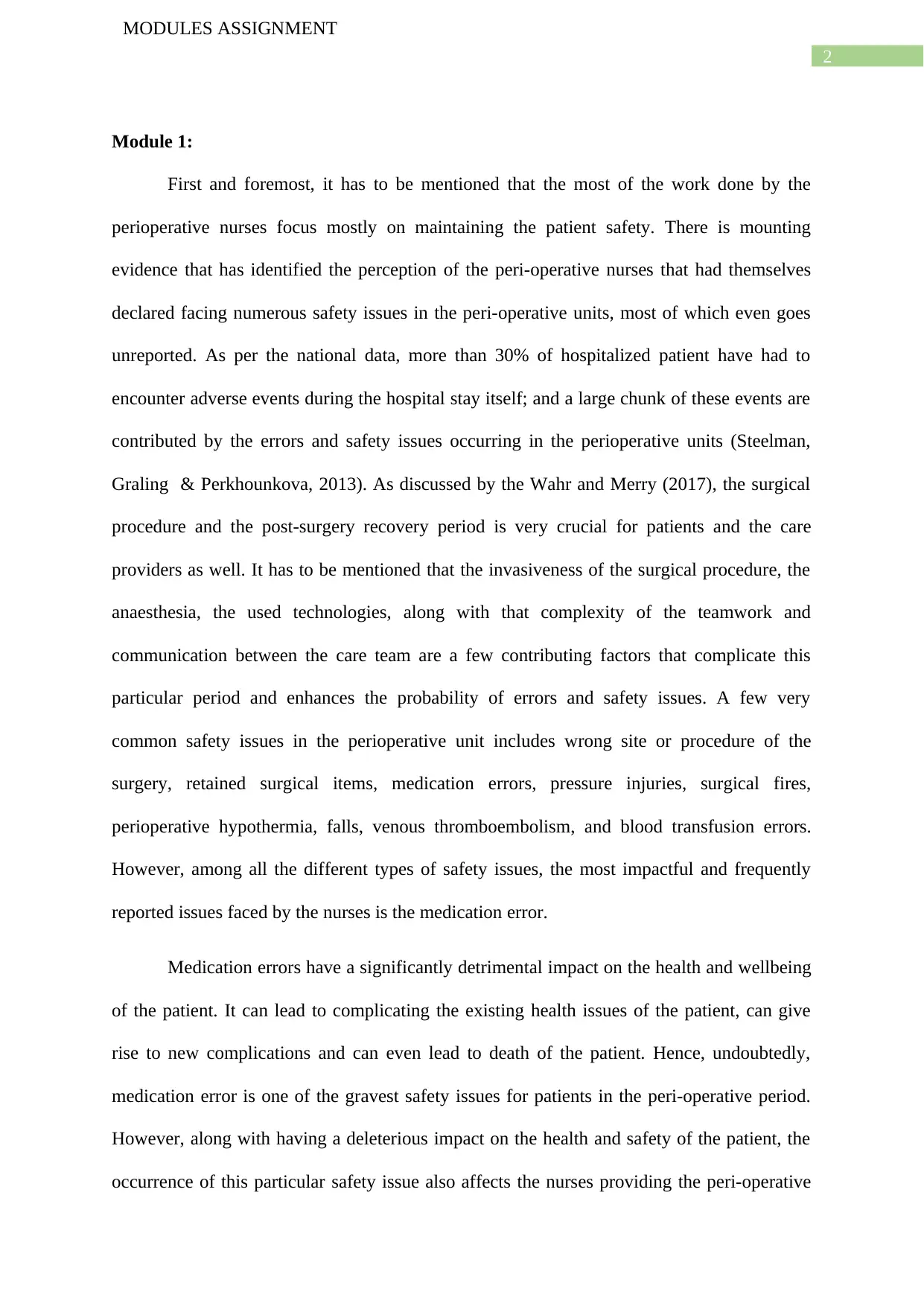
2
MODULES ASSIGNMENT
Module 1:
First and foremost, it has to be mentioned that the most of the work done by the
perioperative nurses focus mostly on maintaining the patient safety. There is mounting
evidence that has identified the perception of the peri-operative nurses that had themselves
declared facing numerous safety issues in the peri-operative units, most of which even goes
unreported. As per the national data, more than 30% of hospitalized patient have had to
encounter adverse events during the hospital stay itself; and a large chunk of these events are
contributed by the errors and safety issues occurring in the perioperative units (Steelman,
Graling & Perkhounkova, 2013). As discussed by the Wahr and Merry (2017), the surgical
procedure and the post-surgery recovery period is very crucial for patients and the care
providers as well. It has to be mentioned that the invasiveness of the surgical procedure, the
anaesthesia, the used technologies, along with that complexity of the teamwork and
communication between the care team are a few contributing factors that complicate this
particular period and enhances the probability of errors and safety issues. A few very
common safety issues in the perioperative unit includes wrong site or procedure of the
surgery, retained surgical items, medication errors, pressure injuries, surgical fires,
perioperative hypothermia, falls, venous thromboembolism, and blood transfusion errors.
However, among all the different types of safety issues, the most impactful and frequently
reported issues faced by the nurses is the medication error.
Medication errors have a significantly detrimental impact on the health and wellbeing
of the patient. It can lead to complicating the existing health issues of the patient, can give
rise to new complications and can even lead to death of the patient. Hence, undoubtedly,
medication error is one of the gravest safety issues for patients in the peri-operative period.
However, along with having a deleterious impact on the health and safety of the patient, the
occurrence of this particular safety issue also affects the nurses providing the peri-operative
MODULES ASSIGNMENT
Module 1:
First and foremost, it has to be mentioned that the most of the work done by the
perioperative nurses focus mostly on maintaining the patient safety. There is mounting
evidence that has identified the perception of the peri-operative nurses that had themselves
declared facing numerous safety issues in the peri-operative units, most of which even goes
unreported. As per the national data, more than 30% of hospitalized patient have had to
encounter adverse events during the hospital stay itself; and a large chunk of these events are
contributed by the errors and safety issues occurring in the perioperative units (Steelman,
Graling & Perkhounkova, 2013). As discussed by the Wahr and Merry (2017), the surgical
procedure and the post-surgery recovery period is very crucial for patients and the care
providers as well. It has to be mentioned that the invasiveness of the surgical procedure, the
anaesthesia, the used technologies, along with that complexity of the teamwork and
communication between the care team are a few contributing factors that complicate this
particular period and enhances the probability of errors and safety issues. A few very
common safety issues in the perioperative unit includes wrong site or procedure of the
surgery, retained surgical items, medication errors, pressure injuries, surgical fires,
perioperative hypothermia, falls, venous thromboembolism, and blood transfusion errors.
However, among all the different types of safety issues, the most impactful and frequently
reported issues faced by the nurses is the medication error.
Medication errors have a significantly detrimental impact on the health and wellbeing
of the patient. It can lead to complicating the existing health issues of the patient, can give
rise to new complications and can even lead to death of the patient. Hence, undoubtedly,
medication error is one of the gravest safety issues for patients in the peri-operative period.
However, along with having a deleterious impact on the health and safety of the patient, the
occurrence of this particular safety issue also affects the nurses providing the peri-operative
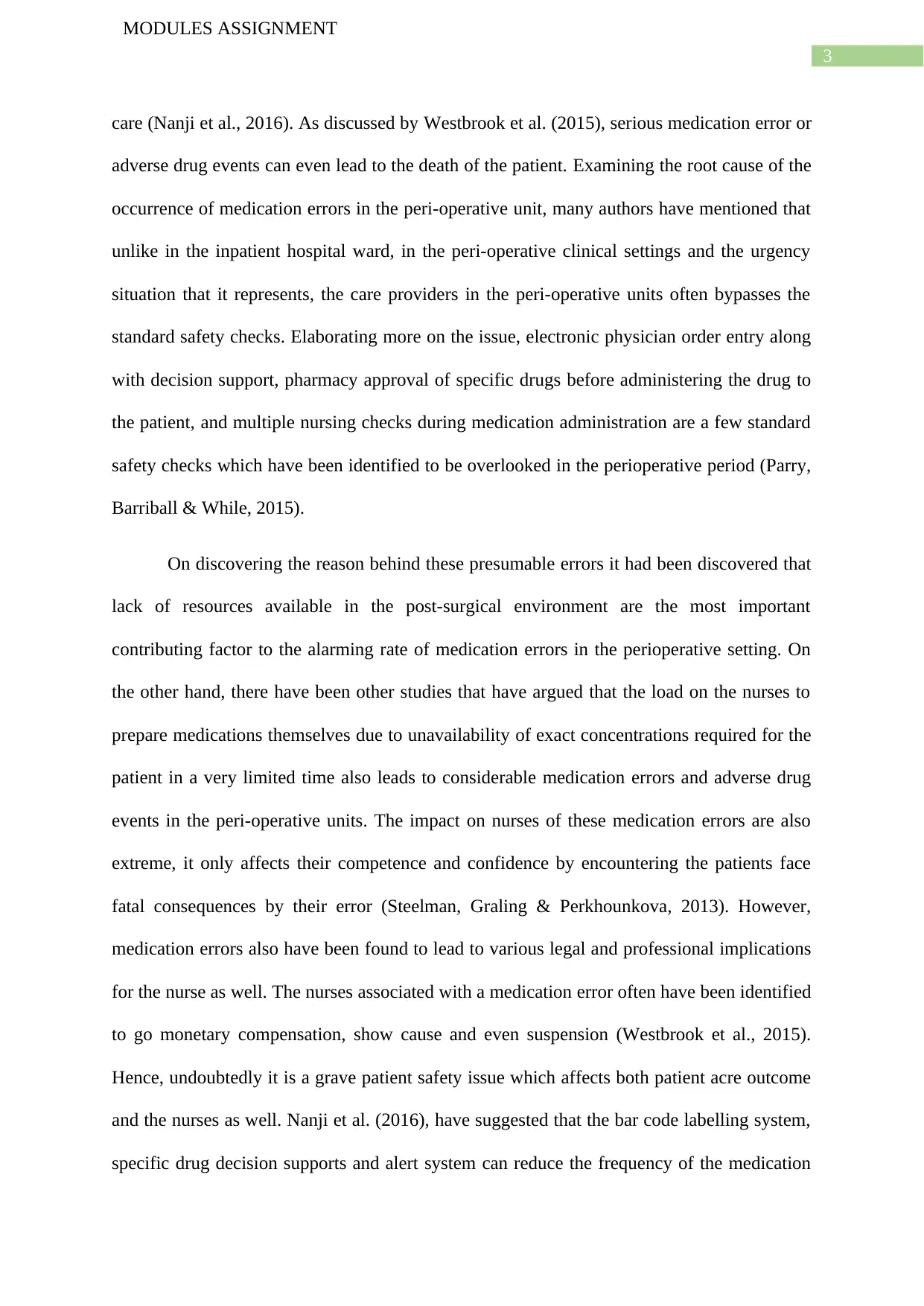
3
MODULES ASSIGNMENT
care (Nanji et al., 2016). As discussed by Westbrook et al. (2015), serious medication error or
adverse drug events can even lead to the death of the patient. Examining the root cause of the
occurrence of medication errors in the peri-operative unit, many authors have mentioned that
unlike in the inpatient hospital ward, in the peri-operative clinical settings and the urgency
situation that it represents, the care providers in the peri-operative units often bypasses the
standard safety checks. Elaborating more on the issue, electronic physician order entry along
with decision support, pharmacy approval of specific drugs before administering the drug to
the patient, and multiple nursing checks during medication administration are a few standard
safety checks which have been identified to be overlooked in the perioperative period (Parry,
Barriball & While, 2015).
On discovering the reason behind these presumable errors it had been discovered that
lack of resources available in the post-surgical environment are the most important
contributing factor to the alarming rate of medication errors in the perioperative setting. On
the other hand, there have been other studies that have argued that the load on the nurses to
prepare medications themselves due to unavailability of exact concentrations required for the
patient in a very limited time also leads to considerable medication errors and adverse drug
events in the peri-operative units. The impact on nurses of these medication errors are also
extreme, it only affects their competence and confidence by encountering the patients face
fatal consequences by their error (Steelman, Graling & Perkhounkova, 2013). However,
medication errors also have been found to lead to various legal and professional implications
for the nurse as well. The nurses associated with a medication error often have been identified
to go monetary compensation, show cause and even suspension (Westbrook et al., 2015).
Hence, undoubtedly it is a grave patient safety issue which affects both patient acre outcome
and the nurses as well. Nanji et al. (2016), have suggested that the bar code labelling system,
specific drug decision supports and alert system can reduce the frequency of the medication
MODULES ASSIGNMENT
care (Nanji et al., 2016). As discussed by Westbrook et al. (2015), serious medication error or
adverse drug events can even lead to the death of the patient. Examining the root cause of the
occurrence of medication errors in the peri-operative unit, many authors have mentioned that
unlike in the inpatient hospital ward, in the peri-operative clinical settings and the urgency
situation that it represents, the care providers in the peri-operative units often bypasses the
standard safety checks. Elaborating more on the issue, electronic physician order entry along
with decision support, pharmacy approval of specific drugs before administering the drug to
the patient, and multiple nursing checks during medication administration are a few standard
safety checks which have been identified to be overlooked in the perioperative period (Parry,
Barriball & While, 2015).
On discovering the reason behind these presumable errors it had been discovered that
lack of resources available in the post-surgical environment are the most important
contributing factor to the alarming rate of medication errors in the perioperative setting. On
the other hand, there have been other studies that have argued that the load on the nurses to
prepare medications themselves due to unavailability of exact concentrations required for the
patient in a very limited time also leads to considerable medication errors and adverse drug
events in the peri-operative units. The impact on nurses of these medication errors are also
extreme, it only affects their competence and confidence by encountering the patients face
fatal consequences by their error (Steelman, Graling & Perkhounkova, 2013). However,
medication errors also have been found to lead to various legal and professional implications
for the nurse as well. The nurses associated with a medication error often have been identified
to go monetary compensation, show cause and even suspension (Westbrook et al., 2015).
Hence, undoubtedly it is a grave patient safety issue which affects both patient acre outcome
and the nurses as well. Nanji et al. (2016), have suggested that the bar code labelling system,
specific drug decision supports and alert system can reduce the frequency of the medication
Secure Best Marks with AI Grader
Need help grading? Try our AI Grader for instant feedback on your assignments.
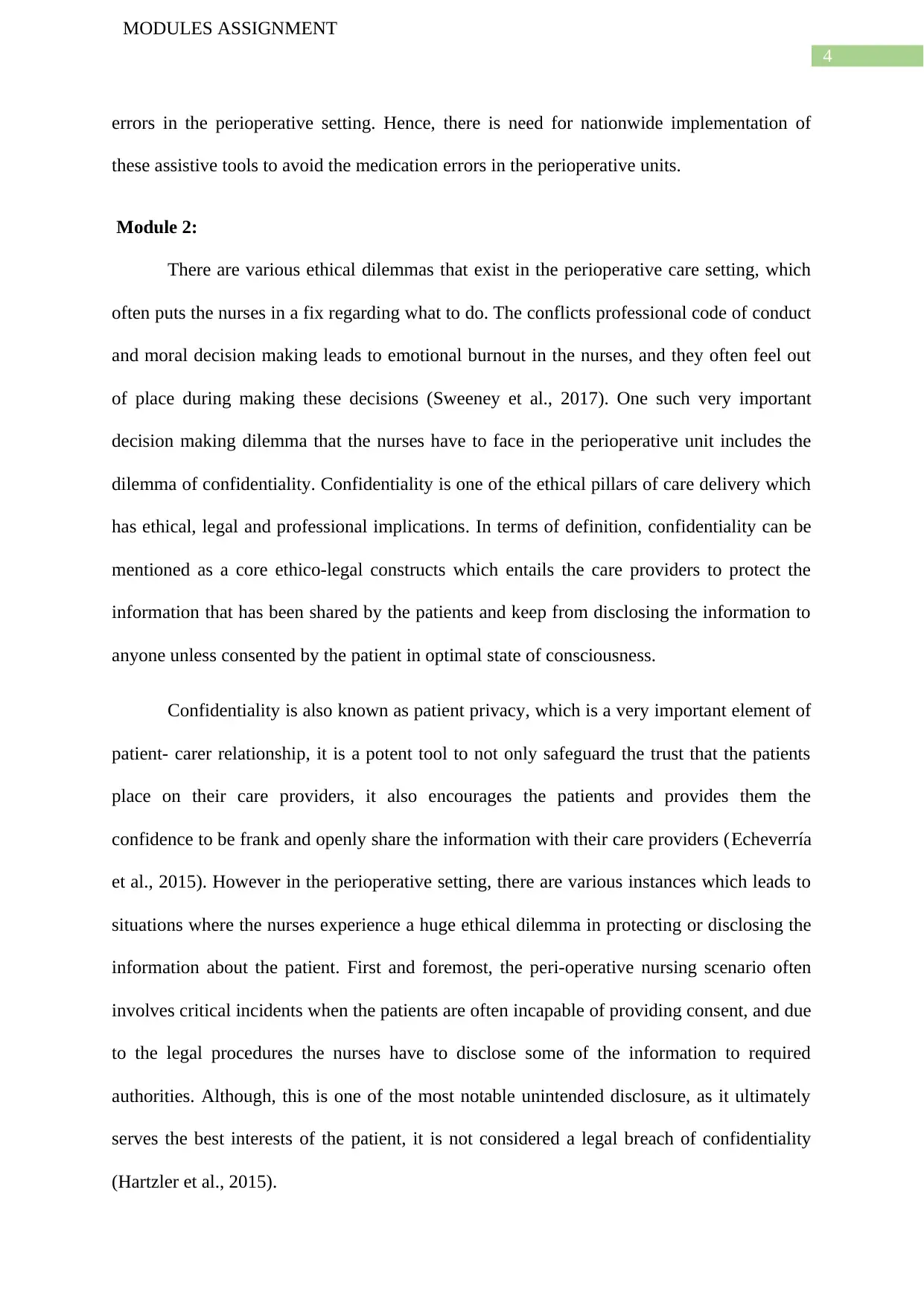
4
MODULES ASSIGNMENT
errors in the perioperative setting. Hence, there is need for nationwide implementation of
these assistive tools to avoid the medication errors in the perioperative units.
Module 2:
There are various ethical dilemmas that exist in the perioperative care setting, which
often puts the nurses in a fix regarding what to do. The conflicts professional code of conduct
and moral decision making leads to emotional burnout in the nurses, and they often feel out
of place during making these decisions (Sweeney et al., 2017). One such very important
decision making dilemma that the nurses have to face in the perioperative unit includes the
dilemma of confidentiality. Confidentiality is one of the ethical pillars of care delivery which
has ethical, legal and professional implications. In terms of definition, confidentiality can be
mentioned as a core ethico-legal constructs which entails the care providers to protect the
information that has been shared by the patients and keep from disclosing the information to
anyone unless consented by the patient in optimal state of consciousness.
Confidentiality is also known as patient privacy, which is a very important element of
patient- carer relationship, it is a potent tool to not only safeguard the trust that the patients
place on their care providers, it also encourages the patients and provides them the
confidence to be frank and openly share the information with their care providers (Echeverría
et al., 2015). However in the perioperative setting, there are various instances which leads to
situations where the nurses experience a huge ethical dilemma in protecting or disclosing the
information about the patient. First and foremost, the peri-operative nursing scenario often
involves critical incidents when the patients are often incapable of providing consent, and due
to the legal procedures the nurses have to disclose some of the information to required
authorities. Although, this is one of the most notable unintended disclosure, as it ultimately
serves the best interests of the patient, it is not considered a legal breach of confidentiality
(Hartzler et al., 2015).
MODULES ASSIGNMENT
errors in the perioperative setting. Hence, there is need for nationwide implementation of
these assistive tools to avoid the medication errors in the perioperative units.
Module 2:
There are various ethical dilemmas that exist in the perioperative care setting, which
often puts the nurses in a fix regarding what to do. The conflicts professional code of conduct
and moral decision making leads to emotional burnout in the nurses, and they often feel out
of place during making these decisions (Sweeney et al., 2017). One such very important
decision making dilemma that the nurses have to face in the perioperative unit includes the
dilemma of confidentiality. Confidentiality is one of the ethical pillars of care delivery which
has ethical, legal and professional implications. In terms of definition, confidentiality can be
mentioned as a core ethico-legal constructs which entails the care providers to protect the
information that has been shared by the patients and keep from disclosing the information to
anyone unless consented by the patient in optimal state of consciousness.
Confidentiality is also known as patient privacy, which is a very important element of
patient- carer relationship, it is a potent tool to not only safeguard the trust that the patients
place on their care providers, it also encourages the patients and provides them the
confidence to be frank and openly share the information with their care providers (Echeverría
et al., 2015). However in the perioperative setting, there are various instances which leads to
situations where the nurses experience a huge ethical dilemma in protecting or disclosing the
information about the patient. First and foremost, the peri-operative nursing scenario often
involves critical incidents when the patients are often incapable of providing consent, and due
to the legal procedures the nurses have to disclose some of the information to required
authorities. Although, this is one of the most notable unintended disclosure, as it ultimately
serves the best interests of the patient, it is not considered a legal breach of confidentiality
(Hartzler et al., 2015).
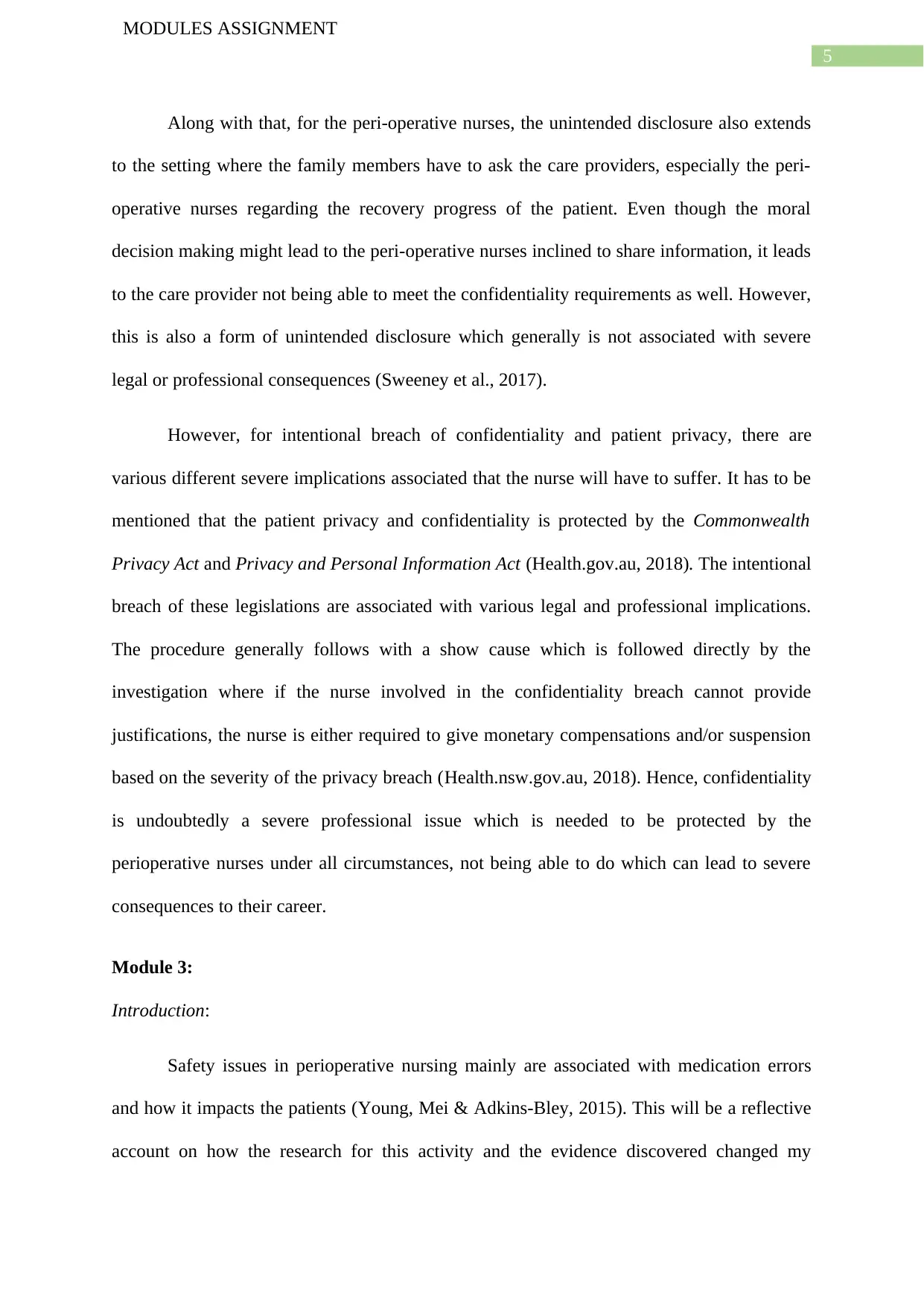
5
MODULES ASSIGNMENT
Along with that, for the peri-operative nurses, the unintended disclosure also extends
to the setting where the family members have to ask the care providers, especially the peri-
operative nurses regarding the recovery progress of the patient. Even though the moral
decision making might lead to the peri-operative nurses inclined to share information, it leads
to the care provider not being able to meet the confidentiality requirements as well. However,
this is also a form of unintended disclosure which generally is not associated with severe
legal or professional consequences (Sweeney et al., 2017).
However, for intentional breach of confidentiality and patient privacy, there are
various different severe implications associated that the nurse will have to suffer. It has to be
mentioned that the patient privacy and confidentiality is protected by the Commonwealth
Privacy Act and Privacy and Personal Information Act (Health.gov.au, 2018). The intentional
breach of these legislations are associated with various legal and professional implications.
The procedure generally follows with a show cause which is followed directly by the
investigation where if the nurse involved in the confidentiality breach cannot provide
justifications, the nurse is either required to give monetary compensations and/or suspension
based on the severity of the privacy breach (Health.nsw.gov.au, 2018). Hence, confidentiality
is undoubtedly a severe professional issue which is needed to be protected by the
perioperative nurses under all circumstances, not being able to do which can lead to severe
consequences to their career.
Module 3:
Introduction:
Safety issues in perioperative nursing mainly are associated with medication errors
and how it impacts the patients (Young, Mei & Adkins-Bley, 2015). This will be a reflective
account on how the research for this activity and the evidence discovered changed my
MODULES ASSIGNMENT
Along with that, for the peri-operative nurses, the unintended disclosure also extends
to the setting where the family members have to ask the care providers, especially the peri-
operative nurses regarding the recovery progress of the patient. Even though the moral
decision making might lead to the peri-operative nurses inclined to share information, it leads
to the care provider not being able to meet the confidentiality requirements as well. However,
this is also a form of unintended disclosure which generally is not associated with severe
legal or professional consequences (Sweeney et al., 2017).
However, for intentional breach of confidentiality and patient privacy, there are
various different severe implications associated that the nurse will have to suffer. It has to be
mentioned that the patient privacy and confidentiality is protected by the Commonwealth
Privacy Act and Privacy and Personal Information Act (Health.gov.au, 2018). The intentional
breach of these legislations are associated with various legal and professional implications.
The procedure generally follows with a show cause which is followed directly by the
investigation where if the nurse involved in the confidentiality breach cannot provide
justifications, the nurse is either required to give monetary compensations and/or suspension
based on the severity of the privacy breach (Health.nsw.gov.au, 2018). Hence, confidentiality
is undoubtedly a severe professional issue which is needed to be protected by the
perioperative nurses under all circumstances, not being able to do which can lead to severe
consequences to their career.
Module 3:
Introduction:
Safety issues in perioperative nursing mainly are associated with medication errors
and how it impacts the patients (Young, Mei & Adkins-Bley, 2015). This will be a reflective
account on how the research for this activity and the evidence discovered changed my
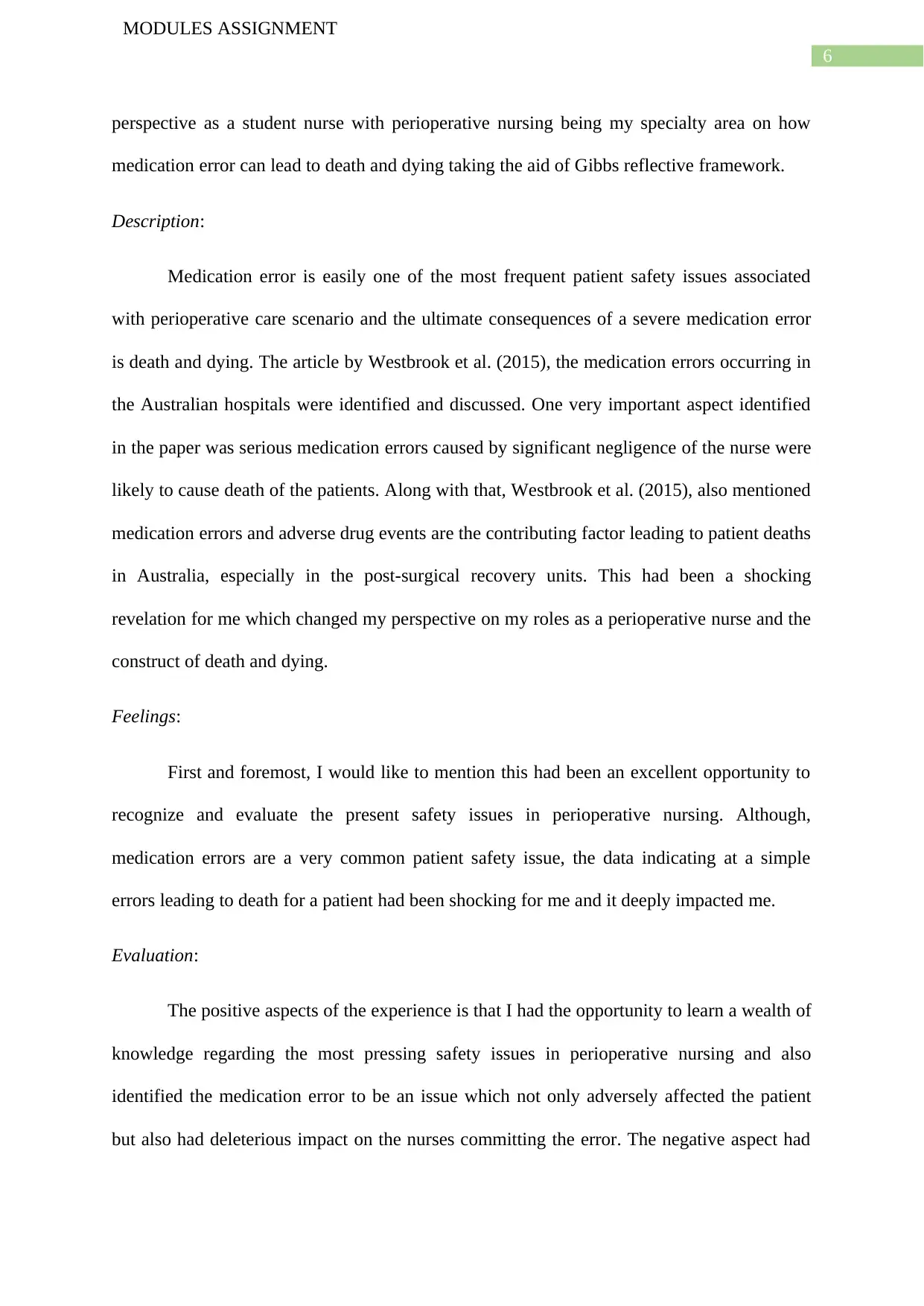
6
MODULES ASSIGNMENT
perspective as a student nurse with perioperative nursing being my specialty area on how
medication error can lead to death and dying taking the aid of Gibbs reflective framework.
Description:
Medication error is easily one of the most frequent patient safety issues associated
with perioperative care scenario and the ultimate consequences of a severe medication error
is death and dying. The article by Westbrook et al. (2015), the medication errors occurring in
the Australian hospitals were identified and discussed. One very important aspect identified
in the paper was serious medication errors caused by significant negligence of the nurse were
likely to cause death of the patients. Along with that, Westbrook et al. (2015), also mentioned
medication errors and adverse drug events are the contributing factor leading to patient deaths
in Australia, especially in the post-surgical recovery units. This had been a shocking
revelation for me which changed my perspective on my roles as a perioperative nurse and the
construct of death and dying.
Feelings:
First and foremost, I would like to mention this had been an excellent opportunity to
recognize and evaluate the present safety issues in perioperative nursing. Although,
medication errors are a very common patient safety issue, the data indicating at a simple
errors leading to death for a patient had been shocking for me and it deeply impacted me.
Evaluation:
The positive aspects of the experience is that I had the opportunity to learn a wealth of
knowledge regarding the most pressing safety issues in perioperative nursing and also
identified the medication error to be an issue which not only adversely affected the patient
but also had deleterious impact on the nurses committing the error. The negative aspect had
MODULES ASSIGNMENT
perspective as a student nurse with perioperative nursing being my specialty area on how
medication error can lead to death and dying taking the aid of Gibbs reflective framework.
Description:
Medication error is easily one of the most frequent patient safety issues associated
with perioperative care scenario and the ultimate consequences of a severe medication error
is death and dying. The article by Westbrook et al. (2015), the medication errors occurring in
the Australian hospitals were identified and discussed. One very important aspect identified
in the paper was serious medication errors caused by significant negligence of the nurse were
likely to cause death of the patients. Along with that, Westbrook et al. (2015), also mentioned
medication errors and adverse drug events are the contributing factor leading to patient deaths
in Australia, especially in the post-surgical recovery units. This had been a shocking
revelation for me which changed my perspective on my roles as a perioperative nurse and the
construct of death and dying.
Feelings:
First and foremost, I would like to mention this had been an excellent opportunity to
recognize and evaluate the present safety issues in perioperative nursing. Although,
medication errors are a very common patient safety issue, the data indicating at a simple
errors leading to death for a patient had been shocking for me and it deeply impacted me.
Evaluation:
The positive aspects of the experience is that I had the opportunity to learn a wealth of
knowledge regarding the most pressing safety issues in perioperative nursing and also
identified the medication error to be an issue which not only adversely affected the patient
but also had deleterious impact on the nurses committing the error. The negative aspect had
Paraphrase This Document
Need a fresh take? Get an instant paraphrase of this document with our AI Paraphraser
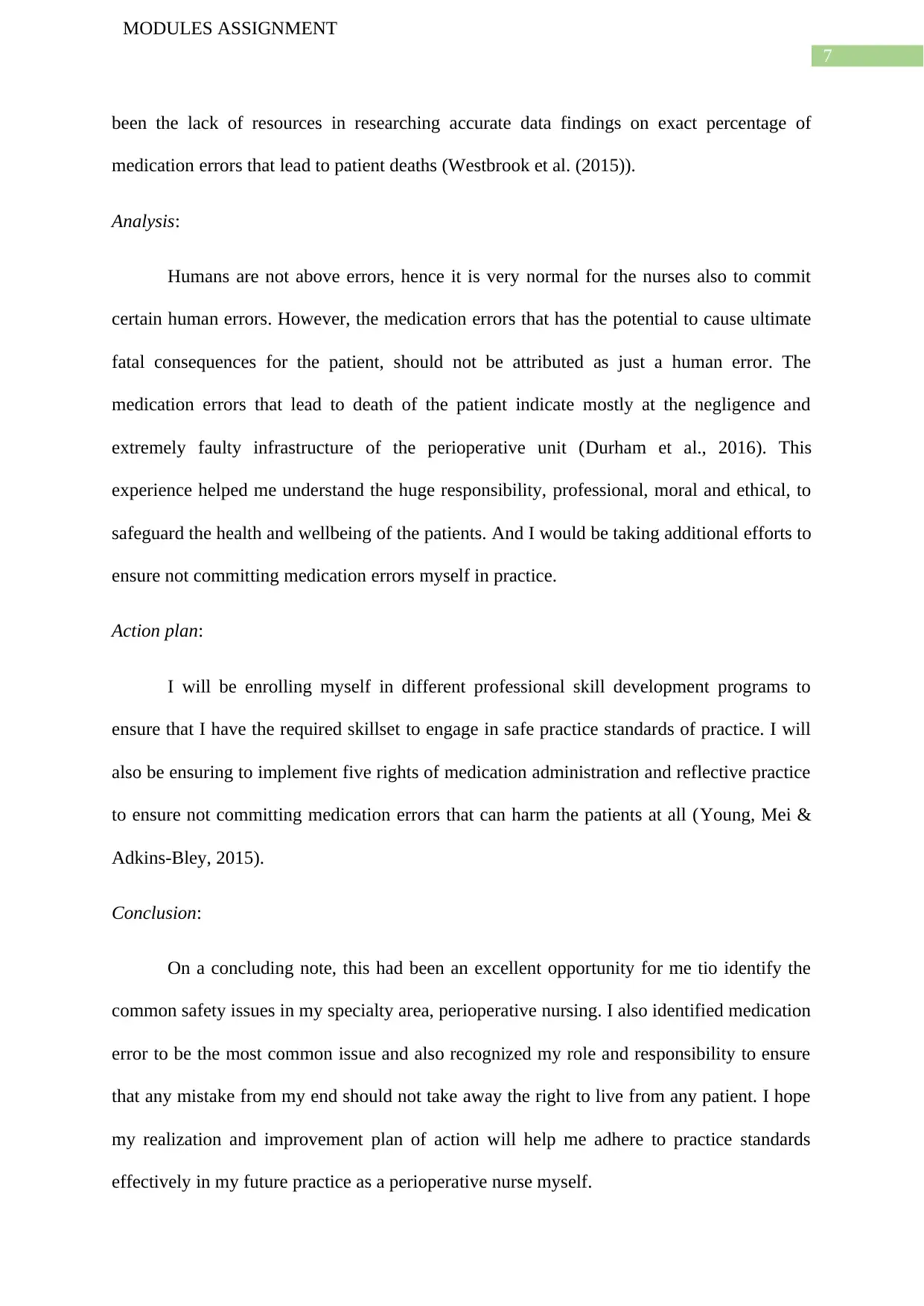
7
MODULES ASSIGNMENT
been the lack of resources in researching accurate data findings on exact percentage of
medication errors that lead to patient deaths (Westbrook et al. (2015)).
Analysis:
Humans are not above errors, hence it is very normal for the nurses also to commit
certain human errors. However, the medication errors that has the potential to cause ultimate
fatal consequences for the patient, should not be attributed as just a human error. The
medication errors that lead to death of the patient indicate mostly at the negligence and
extremely faulty infrastructure of the perioperative unit (Durham et al., 2016). This
experience helped me understand the huge responsibility, professional, moral and ethical, to
safeguard the health and wellbeing of the patients. And I would be taking additional efforts to
ensure not committing medication errors myself in practice.
Action plan:
I will be enrolling myself in different professional skill development programs to
ensure that I have the required skillset to engage in safe practice standards of practice. I will
also be ensuring to implement five rights of medication administration and reflective practice
to ensure not committing medication errors that can harm the patients at all (Young, Mei &
Adkins-Bley, 2015).
Conclusion:
On a concluding note, this had been an excellent opportunity for me tio identify the
common safety issues in my specialty area, perioperative nursing. I also identified medication
error to be the most common issue and also recognized my role and responsibility to ensure
that any mistake from my end should not take away the right to live from any patient. I hope
my realization and improvement plan of action will help me adhere to practice standards
effectively in my future practice as a perioperative nurse myself.
MODULES ASSIGNMENT
been the lack of resources in researching accurate data findings on exact percentage of
medication errors that lead to patient deaths (Westbrook et al. (2015)).
Analysis:
Humans are not above errors, hence it is very normal for the nurses also to commit
certain human errors. However, the medication errors that has the potential to cause ultimate
fatal consequences for the patient, should not be attributed as just a human error. The
medication errors that lead to death of the patient indicate mostly at the negligence and
extremely faulty infrastructure of the perioperative unit (Durham et al., 2016). This
experience helped me understand the huge responsibility, professional, moral and ethical, to
safeguard the health and wellbeing of the patients. And I would be taking additional efforts to
ensure not committing medication errors myself in practice.
Action plan:
I will be enrolling myself in different professional skill development programs to
ensure that I have the required skillset to engage in safe practice standards of practice. I will
also be ensuring to implement five rights of medication administration and reflective practice
to ensure not committing medication errors that can harm the patients at all (Young, Mei &
Adkins-Bley, 2015).
Conclusion:
On a concluding note, this had been an excellent opportunity for me tio identify the
common safety issues in my specialty area, perioperative nursing. I also identified medication
error to be the most common issue and also recognized my role and responsibility to ensure
that any mistake from my end should not take away the right to live from any patient. I hope
my realization and improvement plan of action will help me adhere to practice standards
effectively in my future practice as a perioperative nurse myself.
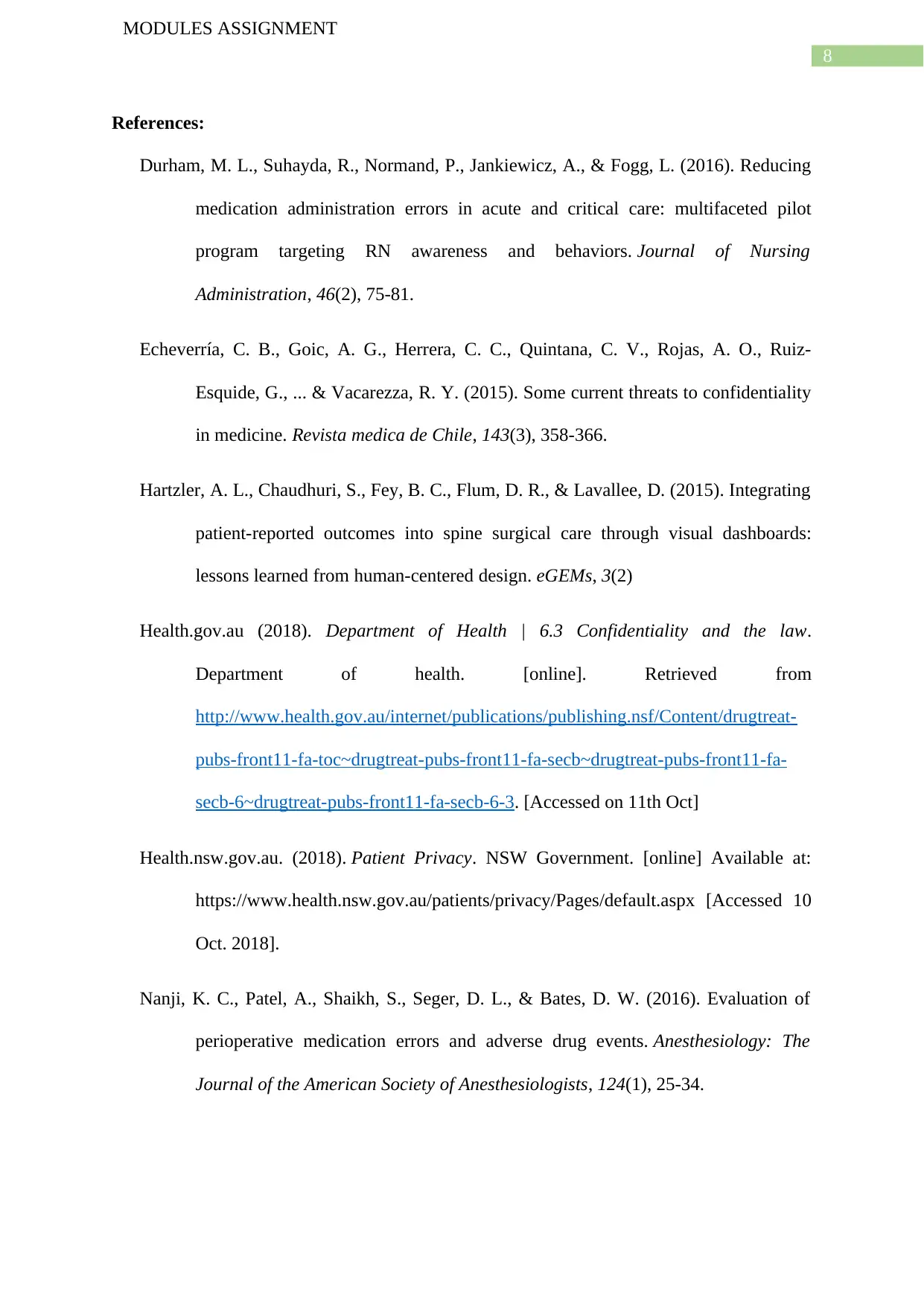
8
MODULES ASSIGNMENT
References:
Durham, M. L., Suhayda, R., Normand, P., Jankiewicz, A., & Fogg, L. (2016). Reducing
medication administration errors in acute and critical care: multifaceted pilot
program targeting RN awareness and behaviors. Journal of Nursing
Administration, 46(2), 75-81.
Echeverría, C. B., Goic, A. G., Herrera, C. C., Quintana, C. V., Rojas, A. O., Ruiz-
Esquide, G., ... & Vacarezza, R. Y. (2015). Some current threats to confidentiality
in medicine. Revista medica de Chile, 143(3), 358-366.
Hartzler, A. L., Chaudhuri, S., Fey, B. C., Flum, D. R., & Lavallee, D. (2015). Integrating
patient-reported outcomes into spine surgical care through visual dashboards:
lessons learned from human-centered design. eGEMs, 3(2)
Health.gov.au (2018). Department of Health | 6.3 Confidentiality and the law.
Department of health. [online]. Retrieved from
http://www.health.gov.au/internet/publications/publishing.nsf/Content/drugtreat-
pubs-front11-fa-toc~drugtreat-pubs-front11-fa-secb~drugtreat-pubs-front11-fa-
secb-6~drugtreat-pubs-front11-fa-secb-6-3. [Accessed on 11th Oct]
Health.nsw.gov.au. (2018). Patient Privacy. NSW Government. [online] Available at:
https://www.health.nsw.gov.au/patients/privacy/Pages/default.aspx [Accessed 10
Oct. 2018].
Nanji, K. C., Patel, A., Shaikh, S., Seger, D. L., & Bates, D. W. (2016). Evaluation of
perioperative medication errors and adverse drug events. Anesthesiology: The
Journal of the American Society of Anesthesiologists, 124(1), 25-34.
MODULES ASSIGNMENT
References:
Durham, M. L., Suhayda, R., Normand, P., Jankiewicz, A., & Fogg, L. (2016). Reducing
medication administration errors in acute and critical care: multifaceted pilot
program targeting RN awareness and behaviors. Journal of Nursing
Administration, 46(2), 75-81.
Echeverría, C. B., Goic, A. G., Herrera, C. C., Quintana, C. V., Rojas, A. O., Ruiz-
Esquide, G., ... & Vacarezza, R. Y. (2015). Some current threats to confidentiality
in medicine. Revista medica de Chile, 143(3), 358-366.
Hartzler, A. L., Chaudhuri, S., Fey, B. C., Flum, D. R., & Lavallee, D. (2015). Integrating
patient-reported outcomes into spine surgical care through visual dashboards:
lessons learned from human-centered design. eGEMs, 3(2)
Health.gov.au (2018). Department of Health | 6.3 Confidentiality and the law.
Department of health. [online]. Retrieved from
http://www.health.gov.au/internet/publications/publishing.nsf/Content/drugtreat-
pubs-front11-fa-toc~drugtreat-pubs-front11-fa-secb~drugtreat-pubs-front11-fa-
secb-6~drugtreat-pubs-front11-fa-secb-6-3. [Accessed on 11th Oct]
Health.nsw.gov.au. (2018). Patient Privacy. NSW Government. [online] Available at:
https://www.health.nsw.gov.au/patients/privacy/Pages/default.aspx [Accessed 10
Oct. 2018].
Nanji, K. C., Patel, A., Shaikh, S., Seger, D. L., & Bates, D. W. (2016). Evaluation of
perioperative medication errors and adverse drug events. Anesthesiology: The
Journal of the American Society of Anesthesiologists, 124(1), 25-34.
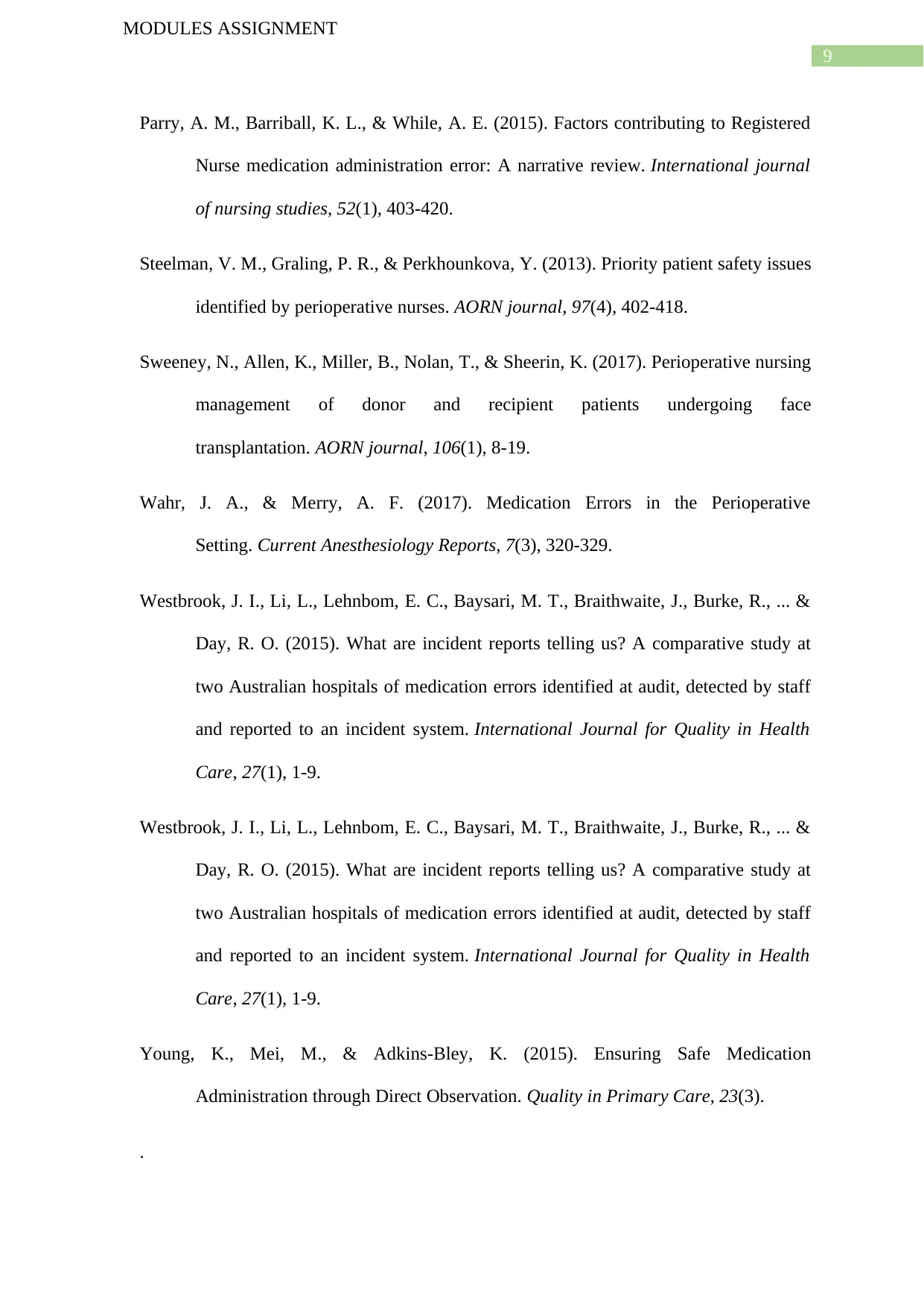
9
MODULES ASSIGNMENT
Parry, A. M., Barriball, K. L., & While, A. E. (2015). Factors contributing to Registered
Nurse medication administration error: A narrative review. International journal
of nursing studies, 52(1), 403-420.
Steelman, V. M., Graling, P. R., & Perkhounkova, Y. (2013). Priority patient safety issues
identified by perioperative nurses. AORN journal, 97(4), 402-418.
Sweeney, N., Allen, K., Miller, B., Nolan, T., & Sheerin, K. (2017). Perioperative nursing
management of donor and recipient patients undergoing face
transplantation. AORN journal, 106(1), 8-19.
Wahr, J. A., & Merry, A. F. (2017). Medication Errors in the Perioperative
Setting. Current Anesthesiology Reports, 7(3), 320-329.
Westbrook, J. I., Li, L., Lehnbom, E. C., Baysari, M. T., Braithwaite, J., Burke, R., ... &
Day, R. O. (2015). What are incident reports telling us? A comparative study at
two Australian hospitals of medication errors identified at audit, detected by staff
and reported to an incident system. International Journal for Quality in Health
Care, 27(1), 1-9.
Westbrook, J. I., Li, L., Lehnbom, E. C., Baysari, M. T., Braithwaite, J., Burke, R., ... &
Day, R. O. (2015). What are incident reports telling us? A comparative study at
two Australian hospitals of medication errors identified at audit, detected by staff
and reported to an incident system. International Journal for Quality in Health
Care, 27(1), 1-9.
Young, K., Mei, M., & Adkins-Bley, K. (2015). Ensuring Safe Medication
Administration through Direct Observation. Quality in Primary Care, 23(3).
.
MODULES ASSIGNMENT
Parry, A. M., Barriball, K. L., & While, A. E. (2015). Factors contributing to Registered
Nurse medication administration error: A narrative review. International journal
of nursing studies, 52(1), 403-420.
Steelman, V. M., Graling, P. R., & Perkhounkova, Y. (2013). Priority patient safety issues
identified by perioperative nurses. AORN journal, 97(4), 402-418.
Sweeney, N., Allen, K., Miller, B., Nolan, T., & Sheerin, K. (2017). Perioperative nursing
management of donor and recipient patients undergoing face
transplantation. AORN journal, 106(1), 8-19.
Wahr, J. A., & Merry, A. F. (2017). Medication Errors in the Perioperative
Setting. Current Anesthesiology Reports, 7(3), 320-329.
Westbrook, J. I., Li, L., Lehnbom, E. C., Baysari, M. T., Braithwaite, J., Burke, R., ... &
Day, R. O. (2015). What are incident reports telling us? A comparative study at
two Australian hospitals of medication errors identified at audit, detected by staff
and reported to an incident system. International Journal for Quality in Health
Care, 27(1), 1-9.
Westbrook, J. I., Li, L., Lehnbom, E. C., Baysari, M. T., Braithwaite, J., Burke, R., ... &
Day, R. O. (2015). What are incident reports telling us? A comparative study at
two Australian hospitals of medication errors identified at audit, detected by staff
and reported to an incident system. International Journal for Quality in Health
Care, 27(1), 1-9.
Young, K., Mei, M., & Adkins-Bley, K. (2015). Ensuring Safe Medication
Administration through Direct Observation. Quality in Primary Care, 23(3).
.
Secure Best Marks with AI Grader
Need help grading? Try our AI Grader for instant feedback on your assignments.

10
MODULES ASSIGNMENT
MODULES ASSIGNMENT
1 out of 11
Related Documents
Your All-in-One AI-Powered Toolkit for Academic Success.
+13062052269
info@desklib.com
Available 24*7 on WhatsApp / Email
![[object Object]](/_next/static/media/star-bottom.7253800d.svg)
Unlock your academic potential
© 2024 | Zucol Services PVT LTD | All rights reserved.




